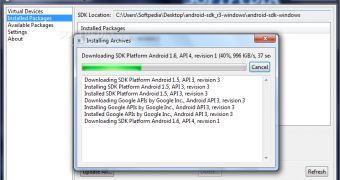As soon as the latest version of Android went official, namely Android 2.2 (Froyo), Google made available a new version of the Android SDK, with support for the new flavor of the OS, and for the new features it brings to the table. At the same time, a new version of the SDK Tools was released, along with Android NDK Revision 4 and with a new Android Development Tools (ADT) plugin Eclipse.
As with the latest versions of Android, the new Android 2.2 platform is available for download as an SDK component, enabling developers to target their applications at more than one flavor of the mobile operating system. The Android SDK and AVD Manager can be used for downloading various components, without needing to download an entirely new SDK package, and developers can get more than one Android platform, Froyo included, to build applications for.
One of the novelties in Froyo includes upgraded APIs, Google unveils, “The Android 2.2 platform delivers an updated version of the framework API. The Android 2.2 API is assigned an integer identifier – 8 – that is stored in the system itself. This identifier, called the 'API Level', allows the system to correctly determine whether an application is compatible with the system, prior to installing the application. To use APIs introduced in Android 2.2 in your application, you need to set the proper value, '8', in the android:minSdkVersion attributes of the <uses-sdk> element in your application's manifest.”
Other new additions to Android 2.2 include app installation on external storage media, enabling developers to choose where their application should be installed, a generalized backup service that enables software solutions to backup and restore user data, new OpenGL ES 2.0 APIs, speech-recognition APIs, device policy management APIs, new display orientation for camera, new UI modes, and others more. All the necessary details on what the Android 2.2 platform brings forth for developers can be found here.
The Android NDK has been updated too, offering developers the possibility to build “performance-critical portions of their apps in native code.” The latest release comes with new Android-specific ABI for ARM-based CPU architectures, a new cpufeatures static library, support for Android 2.2, and more. According to Google, the Android Market now filters apps based on the instruction set information developers include in their solutions. Additional details on the Android NDK are available here.
We should also mention that the ADT Plugin for Eclipse has been brought to version 0.9.7, and that it includes support for the use of library projects during development. A new version of the SDK Tools is now available, too, namely SDK Tools r6. Designed to work with ADT 0.9.7 and later, these tools are the downloadable components of the Android SDK. The same as with the new ADT flavor, the SDK Tools now support the use of library projects during development.
Download the Android SDK for Windows Download the Android SDK for Linux Download the Android SDK for Mac
Download the Android NDK for Windows Download the Android NDK for Linux Download the Android NDK for Mac

 14 DAY TRIAL //
14 DAY TRIAL //